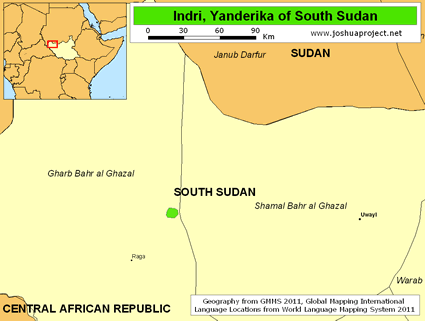The Indri, also known as Yanderika, are a small ethnic group located in Western Bahr el Ghazal State of South Sudan, particularly in Raga County near the Sabil Abu Zalah area. Their primary language is Indri, a Ubangian language spoken by approximately 600 people. The name “Yanderika” is derived from their own term, Ya-ndiri-ka, which was later shortened to Indri.Historically, the Indri have lived in the rugged terrain near Raga, with no clear oral tradition of migration. They believe they were created in the region and have remained there ever since. In the 1930s, they were subjugated by the neighboring Feroghe people, which led to significant cultural assimilation and loss of traditional structures.
The Indri live in small, rural communities with a tropical climate and terrain shaped by perennial streams. Their primary economic activities include subsistence agriculture and small-scale trading. They grow crops such as sorghum, maize, millet, groundnuts, and sesame.Social organization among the Indri has weakened over time due to external pressures and assimilation. Once governed by traditional chiefs, their last known leader was Baningo Zeri before the Feroghe domination. Today, many Indri clans have lost their distinct identity and have been absorbed into neighboring ethnic groups.
The majority of Indri people practice Sunni Islam, accounting for approximately 75% of the population. Around 25% identify as Christian, with only 5% considered evangelical believers. Islam was adopted following their subjugation and cultural influence from neighboring groups.Despite their conversion to Islam, remnants of traditional spirituality persist. The Indri once revered a paramount spirit named Monofelee, to whom they offered feasts called karama. Some ancestral and nature-based rituals continue in rural areas, often blended with Islamic practices.
Access to Scripture is limited for both Christians and seekers due to the absence of a known Bible translation in the Indri language. While resources like the Jesus Film and gospel recordings exist in Sudanese Arabic, the lack of radio broadcasts in Indri hinders effective outreach. Discipleship and evangelism efforts are also challenged by a shortage of trained Christian leaders, leaving many believers without foundational teaching or spiritual support. Additionally, the Indri language and cultural traditions face the threat of extinction due to assimilation and a lack of documentation. Compounding these challenges, many communities suffer from limited access to education, healthcare, and clean water, perpetuating cycles of poverty and preventable disease.
Pray for the translation and distribution of the Bible in the Indri language, asking God to raise up local evangelists and pastors who can disciple believers and plant churches; intercede for spiritual openness among Muslim communities and for respectful conversations about Jesus, as well as for the development of Christian media resources—such as audio recordings, films, and radio—in Indri, and for healing and hope in communities affected by poverty, isolation, and cultural loss.
Scripture Prayers for the Indri, Yanderika in South Sudan.
AI generated by Copilot101 Last Tribes: Indri PeoplePeopleGroups.org: Indri
| Profile Source: Joshua Project |











